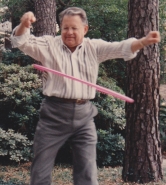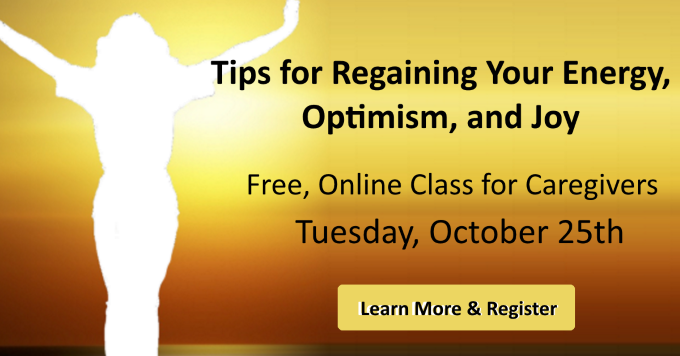Contributing Writer: Vicki Kaufmann, founder CaregiverFamilies.com
Stress can be a lifesaver! Stress can be a killer!
One thing for sure is that caregivers experience stress every day of our lives. From the simple act of getting out of bed in the morning, to dealing with what awaits us during the day, stress hormones are released throughout our bodies. These hormones regulate or modulate changes that occur in the body’s response to stress: blood pressure, heart contractions, and our central nervous system.
We’re Each Unique
Your stress, however, may be very different from what I experience as stress. For example, you may thrill at giving a speech in front of a large audience, or leading a multi-million dollar corporation. While, I, on the other hand, am happy presenting in front of a small support group, and being retired and my own boss.
Moreover, anticipating a stressful situation can be worse than actually being under stress, especially if we ponder about it endlessly. The whole time we’re ruminating, the adrenal glands are secreting the stress hormone cortisol.
Cortisol in normal everyday levels is necessary for our health, maintaining energy balance and helping the body manage stress. During periods of increased stress, the immune cells are bathed in cortisol which is telling them to “stop fighting.” This suppresses the immune system and the inflammatory pathways, and renders the body more susceptible to disease.
Our Health Risks
Long-term exposure to chronic stress can put you at risk for numerous health problems: digestive problems, heart disease, high blood pressure, sleep problems, diabetes, weight gain, memory and concentration impairment, anxiety, depression. (www.MayoClinic.org/healthy-lifestyle/stress-management/in-depth/stress-symptoms)
The Canadian Centre for Studies of Human Stress has devised a clever acronym they call a “recipe for stress.” They have an interesting description which explains the common characteristics of a stressful situation in a nutshell, if you’ll excuse the pun.
It’s “NUTS!”
 A stressor is anything that causes the release of stress hormones. It is the Centre’s hypothesis, built upon years of research, that “although the types of stressors resulting in the release of stess hormones are different for everyone, there are common elements to situations that elevate stress in everyone.” It doesn’t matter our age, marital status, ethnicity, education, or income level.
A stressor is anything that causes the release of stress hormones. It is the Centre’s hypothesis, built upon years of research, that “although the types of stressors resulting in the release of stess hormones are different for everyone, there are common elements to situations that elevate stress in everyone.” It doesn’t matter our age, marital status, ethnicity, education, or income level.
For a situation to be stressful, it must contain one of the following elements. The recipe has two ingredients: a THREAT, and the EMOTIONS that accompany the threat. Here is their recipe:
Threat and Emotion
“N” for NOVELTY – Something new you have not experienced before
“U” for UNPREDICTABILITY – Something you had no way of knowing it would occur
“T” for THREAT TO THE EGO – Your competence as a person is called into question
“S” for SENSE OF CONTROL – You feel you have little or no control over the situation
What Works for You?
 According to the Centre, because stress is such a personal experience, universal stress management techniques don’t work for everyone. For example, many in my family do yoga and jog to stay healthy and release stress. I do not do yoga or jog. It would be torture for me to jog or run a marathon.
According to the Centre, because stress is such a personal experience, universal stress management techniques don’t work for everyone. For example, many in my family do yoga and jog to stay healthy and release stress. I do not do yoga or jog. It would be torture for me to jog or run a marathon.
For me, the relaxation response comes from listening to classical music, walking in nature, and singing, to name a few. You might want to experiment with what works best for you to release and deal with the tension, and in what circumstances.
If you are called to your boss’s office, and aren’t sure what might occur, your heart may start pounding. Your hands may begin sweating; your breathing may become labored. It doesn’t seem feasible to start jogging down the office corridor. But some deep breathing, or imagining that you will be getting a big raise, might help calm you down before you arrive at your boss’s door.
Changing How We Handle Stress
In this New Year we have an opportunity to begin anew, to recharge our lagging spirits or sagging bodies. Use the “NUTS” acronym to reflect on what stresses you most. Then make a plan for releasing this energy in healthy ways.
May you have a happy, healthy 2016!
Want to learn more? Visit the replay page for the free, one-hour webinar we held on January 19, 7:00 PM (EST), sponsored by Together in This. Vicki shared many ideas and tips for stress management that can be helpful tools for anyone.
You can watch the replay here:
A Trove of Tips for Managing Caregiver Stress
 About the author: Vicki Kaufmann blogs bi-weekly on her website, Caregiver Families, and has written and self-published a memoir about her experience caring for her mother who had Alzheimer’s and vascular dementia.
About the author: Vicki Kaufmann blogs bi-weekly on her website, Caregiver Families, and has written and self-published a memoir about her experience caring for her mother who had Alzheimer’s and vascular dementia.
Prior to her retirement in 2012, Vicki was a professional family counselor, certified family life educator, certified professional fundraiser, founder and director of a Catholic Charities office in Michigan, and Chief Operating Officer for Catholic Charities in South Florida.
If you like what you’ve read, why not receive periodic updates when you:
Subscribe to the TinT Newsletter
Miss Vicki’s other FREE Empowerment Class? Click below to see the replay:
Do you have any questions or thoughts? Let me know by commenting below:






Leave a Reply